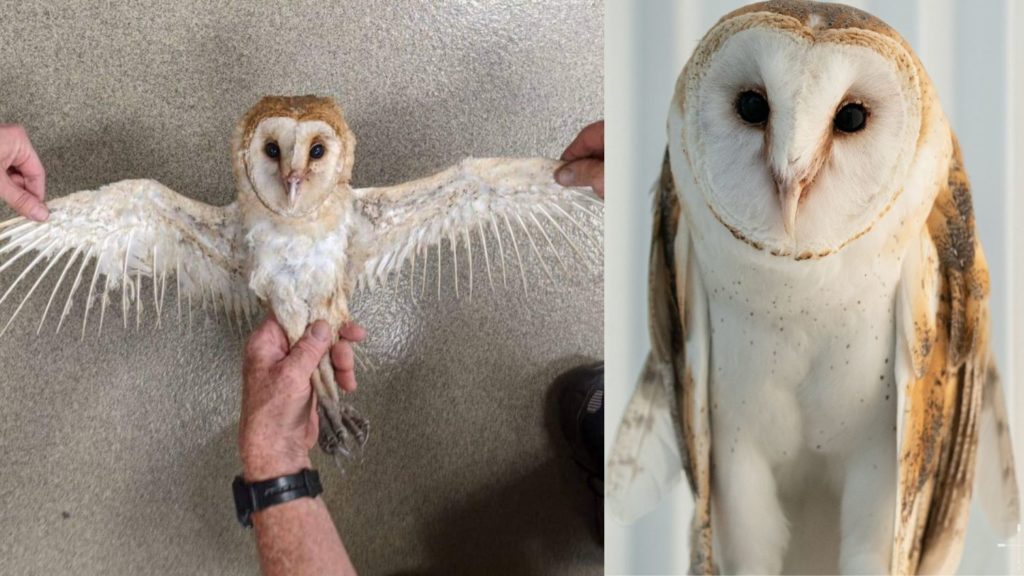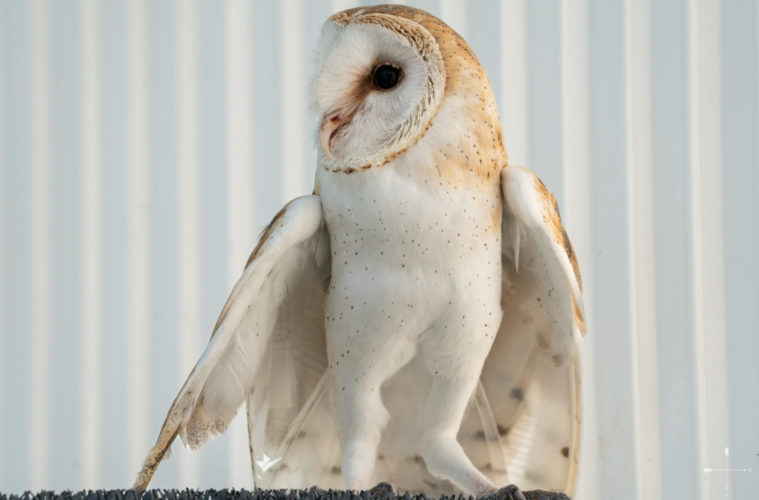A barn owl rescued from by firefighters during the Silverado Fire in October 2020 continues to make progress in rehabilitation, recently celebrating two years of recovery. The owl, who was given the name Smokey, had lost all of its feathers after suffering severe burns.
While not yet back to full strength, Smokey continues to impress volunteer caretakers and veterinarians at the OC Bird Of Prey Center, who say the lucky bird has displayed resilience in a remarkable recovery.

Joanne McDermott, who has volunteered at the OCBPC for about six years, called Smokey’s recovery unprecedented.
“Most raptors molt sequentially – a feather, or two at a time,” McDermott explained. “It’s basically an unprecedented thing for a raptor to lose all its feathers at the same time. So, it’s quite a bit of growing feathers — they don’t normally grow feathers all at once.”
It is uncertain at this point if Smokey will regain full-flight capabilities that will allow for his re-release into the wild, but considering the amount of recovery from the extent of his injuries as a result of the fire, Smokey continues to defy the odds.
McDermott expects Smokey to be released eventually, but said there is no target date for the raptor.
Dr. Scott Weldy, President of the OCBPC, is the veterinarian that initially treated Smokey. Given the extent of the injuries the raptor sustained, Weldy shared that in more than 30 years of working with animals, Smokey’s recovery is something he has never experienced.
When asked if he had seen a recovery of this nature, Weldy responded, “Not personally, no – I’ve seen bad ones. You can burn your mustache or eyebrows with a sparkler that goes off wrong, but this is damage to the skin and the tissue,” he said.
Hi all! I'm Smokey the Barn Owl! Many of you have heard about me but just to get you up to speed: I was found on 10-27-2020 during the Silverado Fire in Orange County, California by @OCFA_PIO. pic.twitter.com/QAsf1KM8HL
— Smokey The Barn Owl (@SmokeyTheOwl) October 30, 2020
In addition to smoke inhalation, Weldy said Smokey received severe thermal burns on the underlying skin on the top and bottom of his wings. Weldy added that until Smokey can rebuild the main flight feathers, he will have difficulty flying.
“He’s gotta have full-feathers – when he puts his wings out, there’s a lot of open spots. He hasn’t grown the new feathers,” Weldy said. “He can fly right now, just not real well.”
Weldy reiterated that Smokey’s road to recovery has been difficult, and did not have a definite timetable on when he expected the bird to fully recover. But, based on his observations, Smokey continues to improve day by day.
“He’s got most of his body feathers on but he’s still missing a few primary feathers here and there, so he doesn’t fly very well. The main flight feathers — the follicles have been damaged, but I mean, it’s amazing because the first year he didn’t really molt well in the fall, so this year he’s really molted in a lot of the damaged ones. But I don’t know if he’s going to finish that molt next year,” he said. “It’s been a long, long path.”
Smokey, on the other hand, remains unimpressed with the help of Weldy and other volunteers, like McDermott, assisting in his rehabilitation at the Lake Forest-based OCBPC.
But, that might be a good thing.
“He definitely doesn’t like us,” Weldy said. “That’s good, he’s not habituated to us. He has other barn owls around him, he has a large cage that he flies in. Sometimes he’s by himself, sometimes he’s with five to 10 birds, so mentally he’s got — as best we can give it to him — stimulation and interaction.”
The main hurdle will be regrowing the main flight feathers. And considering the condition of Smokey’s burned follicles, Weldy says only time will tell if that regrowth will happen.
“That’s the big problem, he hasn’t healed completely from all these scars that he had from the fire.”
For now, Weldy says Smokey is simply eating and being a barn owl. From Weldy’s perspective, Smokey continues to demonstrate a natural quest for survival in his recovery, as volunteers continue to hope he can molt his way back to natural flight.
“He’s a very rare case,” McDermott said. “I would say he’s a very, very lucky bird to have been found by the right people, and then brought to the right people.”
A GoFundMe page, established when the Smokey was originally rescued has raised $4,890 of its $5,000 goal.
Advertising disclosure: We may receive compensation for some of the links in our stories. Thank you for supporting Irvine Weekly and our advertisers.

